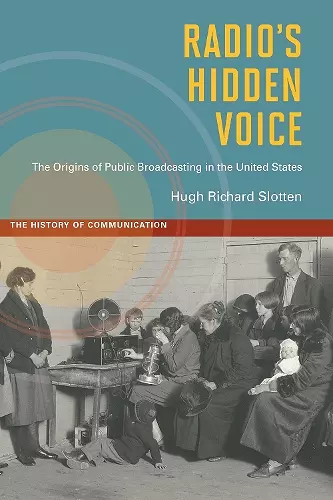Radio's Hidden Voice
The Origins of Public Broadcasting in the United States
Format:Hardback
Publisher:University of Illinois Press
Published:25th Jun '09
Currently unavailable, and unfortunately no date known when it will be back

A detailed study of American public radio's early history
Since the 1960s, the existence of a largely noncommercial public broadcasting system has become a familiar feature of American cultural and social life. Most histories of broadcasting, however, overlook public radio's early development during the 1920s and 1930s by focusing on the mainstream, hegemonic practices of large commercial stations connected to networks. This focus on the development of the "American System" of commercial broadcasting as a master narrative has obscured the historical importance of alternative means of radio broadcasting and their complex interaction with dominant trends.
Employing extensive research from archives across the United States, Hugh Richard Slotten examines the origins of alternative broadcasting models based especially on a commitment to providing noncommercial service for the public. These stations, operated largely by universities and colleges, offered diverse forms of programming meant not merely to entertain but also to educate, inform, enlighten, and uplift local citizens.
Radio stations operated by institutions of higher education were especially significant because they helped pioneer the idea and practice of broadcasting in the United States. Faculty members in physics, electrical engineering, and other technical fields possessed the fundamental scientific knowledge and practical engineering innovation necessary for radio's propagation. Further, the established traditions of public service at universities, especially land-grant colleges in the Midwest, provided a robust framework for offering a publicly available, noncommercial alternative to the emerging commercial broadcast system.
Winner of the Best Book in Journalism and Mass Communication given by the History Division of the Association for Education in Journalism and Mass Communication (AEJMC), 2010.
"Undergirding this discussion with prodigious research in primary sources, Slotten provides an ambitious history of public broadcasting in the US. . . . Recommended."--Choice
"This is a masterful work. It is for anyone interested in exploring the ways in which education institutions helped develop broadcast policy in the United States."--Journalism History
"A gem of a look a the birth of public broadcasting."--Jhistory
"An important contribution to the histories of both radio and higher education."--The Annals of Iowa
"Impressively researched and clearly written, Radio's Hidden Voice recovers a lost and important chapter in American broadcasting history."--James L. Baughman, author of Same Time, Same Station: Creating American Television, 1948-1961
"This thoroughly researched and engaging account constitutes an important contribution to the growing shelf of scholarship on public radio, early radio history, and on questions of how the 'public interest' has been defined in broadcast and communication policy in the twentieth century."--Jason Loviglio, author of Radio's Intimate Public: Network Broadcasting and Mass-Mediated Democracy
- Winner of <DIV>Winner of the Best Book in Journalism and Mass Communication given by the History Division of the Association for Education in Journalism and Mass Communication (AEJMC), 2010.</DIV> 2010
ISBN: 9780252034473
Dimensions: 229mm x 152mm x 28mm
Weight: 680g
344 pages